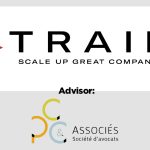Blackford Capital, a national private equity firm headquartered in Grand Rapids, Mich., recently announced its investment in Chesterfield, Mich.-based Davalor Mold Corporation (Davalor), a leading manufacturer of injection moulded plastic products.
Talmer Bank provided financing for the transaction, which is the eighth by Blackford’s Michigan Prosperity Fund, which invests in Michigan companies to generate best-inclass equity returns and support the state’s economy.
With nearly 40 years of experience in the injection moulded plastic products industry, brothers Dave, Orm, and Al Bernhardtfounded Davalor in 1979. Davalor’s products are primarily sold to the automotive sector and include crucial safety equipment, such as seatbelt retractor components, buckle covers, webbing guides, air bag systems, and other products. In addition to its wide range of quality products, Davalor also sets itself apart from the competition with custom manufacturing capabilities and exceptional customer service.
“We believe that Davalor’s production processes and in-house tooling and engineering capabilities make it one of the most versatile injection moulded plastics producers in the industry today,” said Martin Stein, founder and managing director of Blackford Capital.
“Its strategic location in the Metropolitan Detroit area allows the Company to provide its customers with technical input early in the product development process, while also offering cost-effective support to its Tier 1 customers. The Company has established a strong presence in the automotive manufacturing industry throughout the United States, and we see opportunities for continued growth in this region, along with significant customer expansion into Mexico. We are excited by the opportunity to not only drive growth at Davalor, but also offer new jobs and advancement opportunities for current employees.”
Advisor Interview - Brian Willingham, President of Diligentia Group
Could you tell us a little about your work?
I am the president of Diligentia Group, a boutique investigative firm based in Katonah, New York. We work with a number of investors around the world conducting due diligence investigations where we are asked to assess the background and reputation of a potential business partners or key players in a venture before entering into a substantial financial relationship. While that primarily involves conducting in-depth background investigations on some of the key players to identify risk-related issues, we have also identified sources and gathered intelligence to get a better understanding of the reputation of businesses as well.
Why types of risks do your investigations come across?
We pride ourselves on digging deep to find critical issues so that our clients can make more informed decisions. In some cases, our investigations have come across deal-breaking issues where we have found the proverbial “skeletons” in the closet. But in other instances, we find issues that may change the structure of the deal, such as key individuals who have a history of discrimination complaints, CFOs who have a history of financial troubles, executives who have embellished credentials, history of litigation or even criminal charges.
What advice would you give to firms considering hiring a firm to conduct investigative due diligence?
First, “Googling” is not doing due diligence. Too many firms are investing millions of dollars and are not willing to put the resources into conducting proper investigative due diligence. That is, until they have a bad experience. Second, it’s critical that the firm that you hire has the skills and expertise working with these types of transactions so that they can provide clients with information that is timely, accurate and easy to digest. Lastly, each transaction is unique and should be treated that way. For example, transactions in an industry fraught with bribery and corruption should include some additional scrutiny or sourcing checks.
What challenges do you face when you are working on these deals?
The biggest challenge is usually timing. More often than not, the investigative due diligence process is done at the completion of the deal. Given the depth that we look into individuals and the manual nature of the work, such as hand-checking court records, it’s always a challenge to balance tight deadlines with thoroughness. It’s critical to keep an open dialog with the investigator to manage those expectations.








